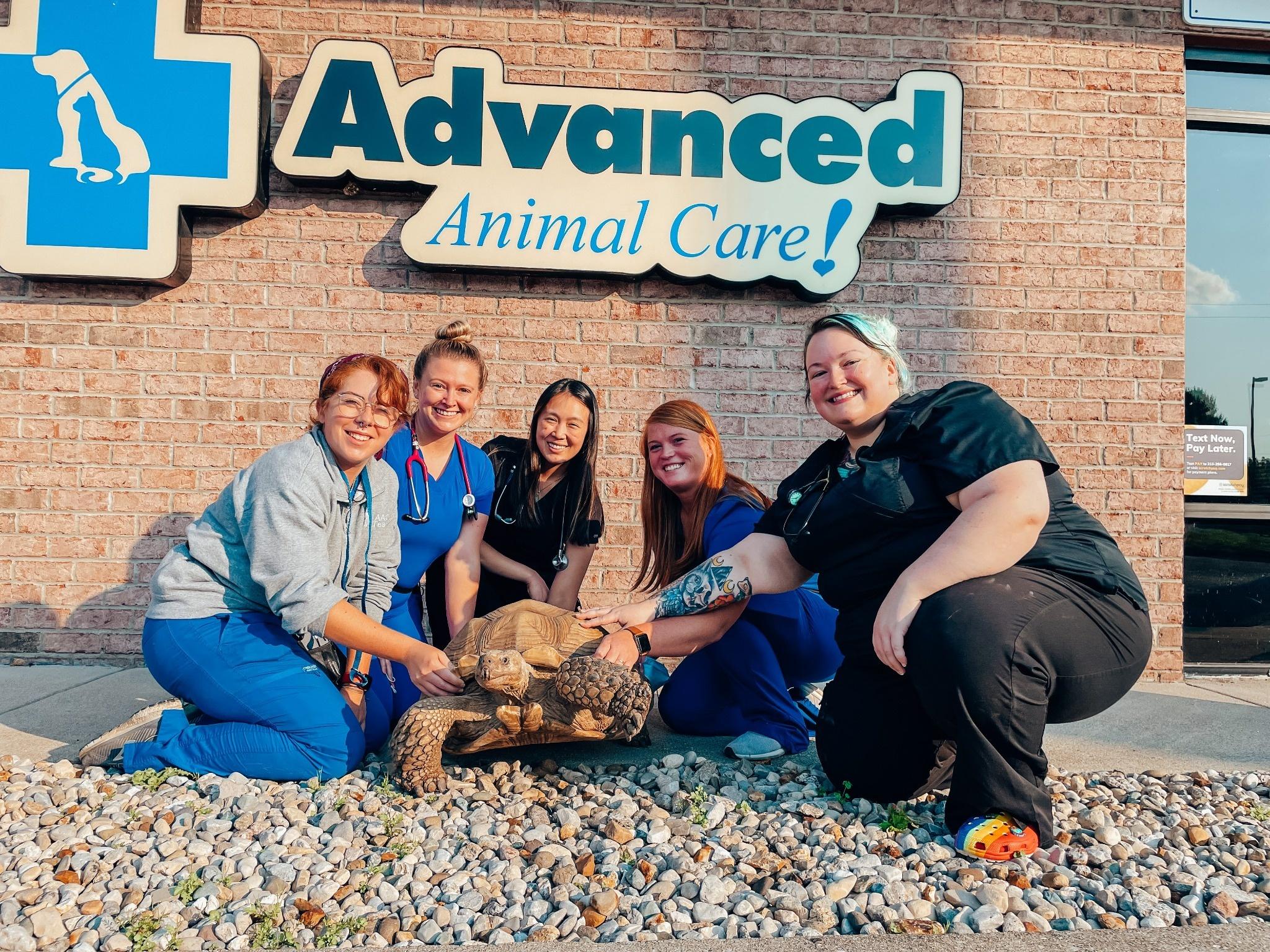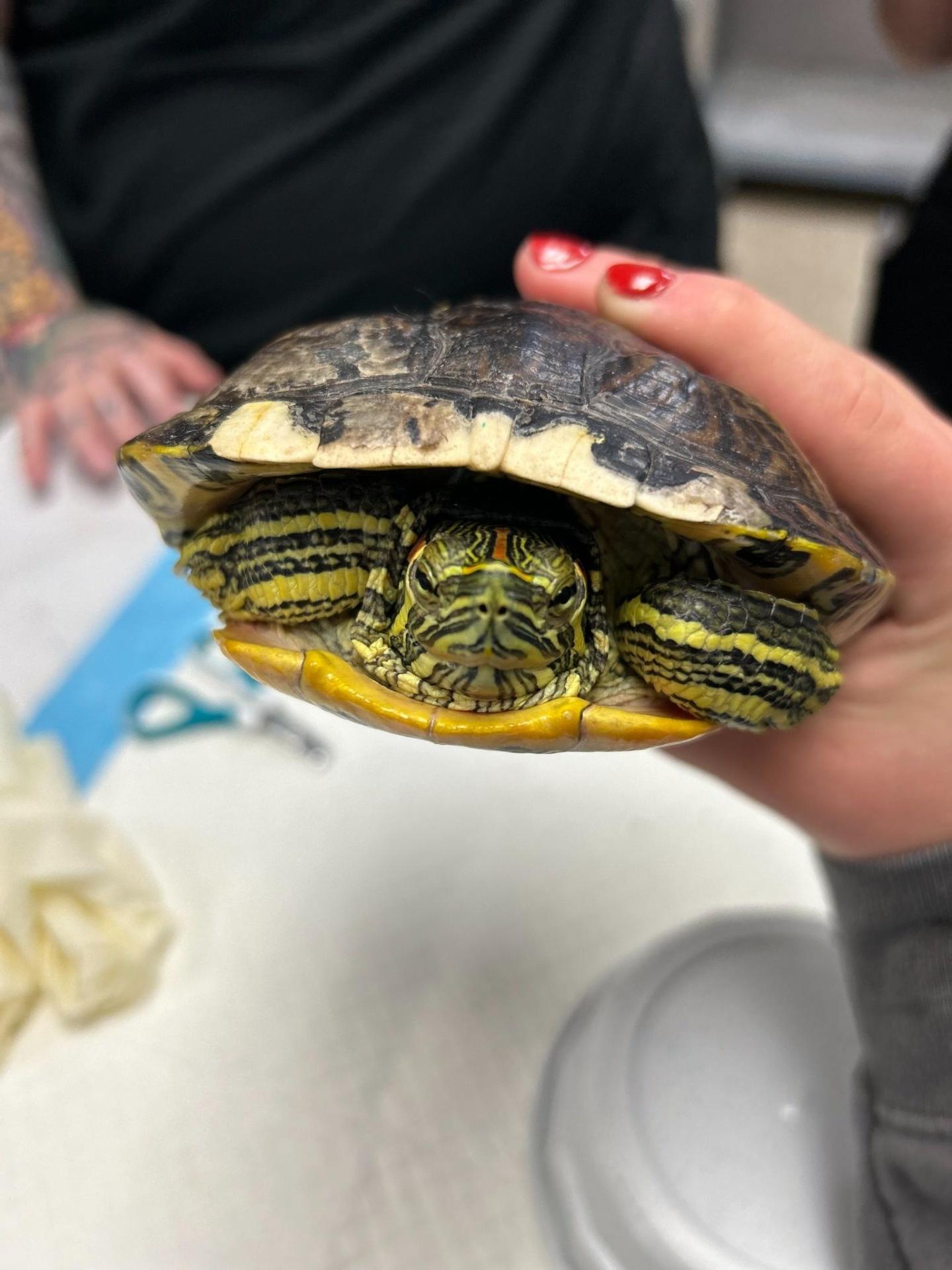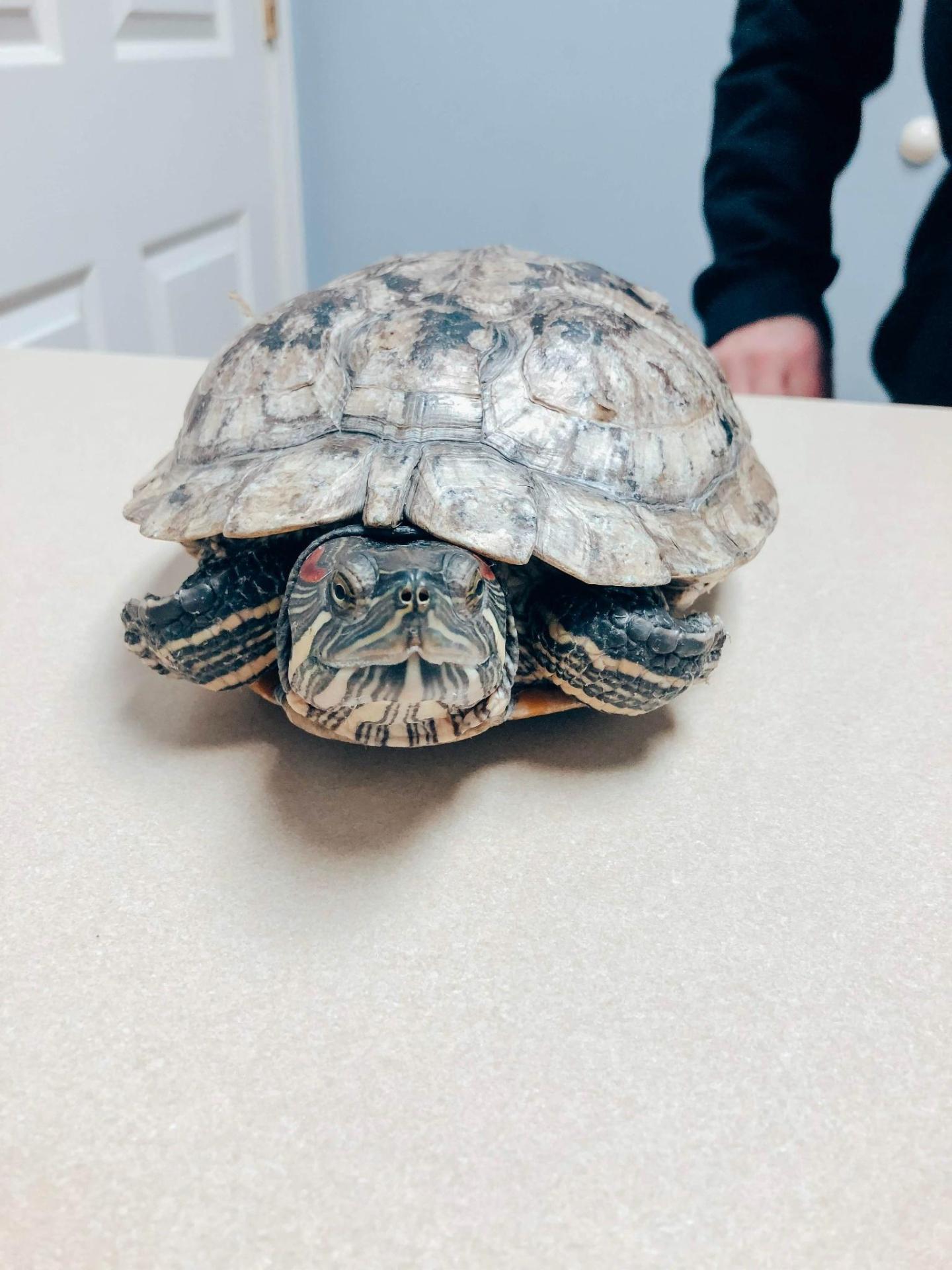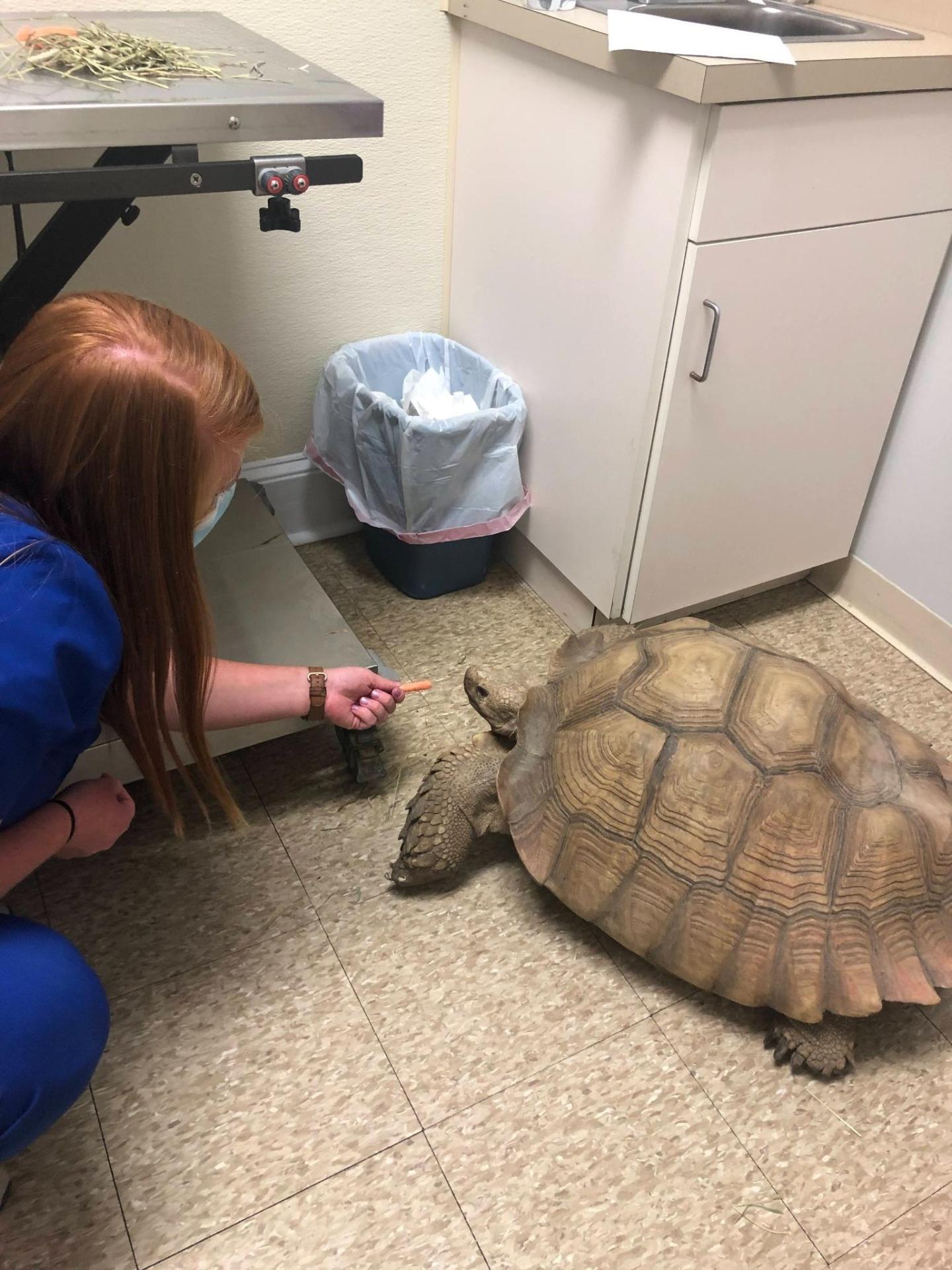Turtle Care at Advanced Animal Care ER 
Expert and Compassionate Care for Your Pet Turtle
Turtles are unique, long-lived pets that require specialized care to stay healthy and thrive. Whether you're a first-time turtle owner or an experienced enthusiast, our team at Advanced Animal Care ER is here to provide expert care for your pet turtle. From routine wellness exams to emergency treatments, we are committed to providing the best care for your shelled companion.
What to Expect During Your Turtle's Visit: 
When you bring your turtle to Advanced Animal Care ER, you can expect compassionate, high-quality care from our team. Here’s what to expect during an initial visit:
-
Comprehensive Physical Exam: Our veterinarian will conduct a thorough exam to check your turtle’s overall health, including their shell, eyes, and body condition.
-
Diet and Habitat Review: We’ll discuss your turtle’s diet, habitat, and any behavioral changes to ensure they are in the right living conditions.
-
Diagnostic Testing: If necessary, we may recommend diagnostic tests such as bloodwork, fecal exams, or x-rays to diagnose any underlying health concerns.
-
Personalized Care Plan: Based on the exam and diagnostic results, we will provide a customized care plan for your turtle, including diet adjustments, habitat changes, or treatments for health conditions.
Common Turtle Health Concerns We Treat:
Turtles are generally healthy but can face specific issues that require veterinary care. Some of the most common concerns we address include:
-
Shell Rot: A fungal or bacterial infection that can cause soft spots or discolored areas on the shell.
-
Respiratory Infections: Often caused by improper temperature or humidity levels, respiratory infections can lead to sneezing, nasal discharge, and labored breathing.
-
Parasites: Internal parasites, such as worms, or external parasites like mites and ticks, can affect your turtle’s health.
-
Metabolic Bone Disease (MBD): This condition, caused by a calcium deficiency, can lead to weakened bones and abnormal shell growth.
-
Obesity: If a turtle is overfed or not provided with the correct balance of nutrients, it can become obese, which leads to a variety of health problems.
Prompt care can prevent these issues from becoming serious health threats.
Turtle Care FAQs:
How do I transport my pet turtle to the vet?
Transport your turtle in a secure carrier that provides ample space and ventilation. Use soft bedding, such as paper towels, to prevent injury, and ensure the carrier is well-ventilated to allow the turtle to breathe easily.
What types of turtles are common as pets?
Some of the most common pet turtle species include:
-
Red-eared sliders
-
Box turtles
-
Painted turtles
-
Map turtles
-
Greek tortoises (a type of land turtle)
What do turtles eat?
Turtles are omnivores, meaning they eat both plant and animal matter. A balanced diet includes:
-
Commercial turtle pellets
-
Leafy greens (e.g., collard greens, dandelion greens)
-
Fresh vegetables (e.g., carrots, squash)
-
Insects (e.g., crickets, mealworms)
-
Fish or cooked chicken (for some species)
How do I create a turtle habitat?
A suitable turtle habitat includes:
-
A secure enclosure (e.g., tank or pond)
-
Proper lighting (UVB light to aid in calcium absorption)
-
A heat source (for basking)
-
Water for aquatic species (clean, shallow water to avoid drowning)
-
Basking area to dry off and regulate body temperature
-
Shelter for privacy and security
Do turtles need a heat lamp?
Yes, turtles require a heat lamp or UVB light to help regulate their body temperature and promote calcium absorption for healthy shell growth. The light should be placed in the basking area of their enclosure.
Do turtles need vitamins or supplements?
Yes, turtles need calcium and vitamin D3 supplements to ensure healthy shell growth and bone strength. These can be added to their diet if they are not getting enough from their food.
How long do turtles live?
Turtles can live for a long time, with some species living up to 50–100 years in the wild. Pet turtles can live for 20–40 years or more with proper care.
Do turtles have teeth?
No, turtles do not have teeth. Instead, they have sharp beaks that help them tear food into smaller pieces.
Do turtles need water?
Yes, aquatic turtles need a water source to swim in, and land turtles (terrestrial species) need water for drinking and soaking. Fresh water should be available at all times.
What are the symptoms of a sick turtle?
Signs that your turtle may be sick include:
-
Refusal to eat
-
Lethargy
-
Swollen or infected eyes
-
Labored breathing
-
Soft or discolored shell
-
Excessive shedding of the skin
-
Nasal discharge
If your turtle shows any of these signs, contact us immediately for an appointment.
What are zoonotic diseases that turtles can carry?
Turtles can carry salmonella bacteria, which can be transmitted to humans through contact with their skin, water, or environment. Always wash your hands thoroughly after handling your turtle or cleaning their habitat.
Why is it important to avoid self-diagnosing a medical issue with my turtle?
Turtles can hide symptoms of illness, making it hard to spot issues early. Self-diagnosing can lead to incorrect treatments that may harm your turtle. It’s important to consult with a veterinarian for proper diagnosis and care.
How soon should I bring my pet in to see a veterinarian if I suspect something is wrong with my turtle?
If your turtle is exhibiting signs of illness (e.g., not eating, lethargy, shell issues), bring them to the vet immediately. Early diagnosis and treatment are crucial to preventing serious health issues.
Signs Your Turtle Needs Immediate Care:
If your turtle shows any of the following symptoms, it may need urgent care:
-
Refusal to eat for more than 2–3 days
-
Excessive swelling of the eyes or limbs
-
Labored or raspy breathing
-
Soft spots or cracks in the shell
-
Discharge from the nose or mouth
If you notice any of these signs, please contact us immediately for urgent care.
How to Schedule an Appointment:
To schedule an appointment for your turtle, call Advanced Animal Care Emergency at 859-625-5678. Our team is here to provide the best care for your turtle.

